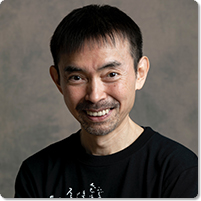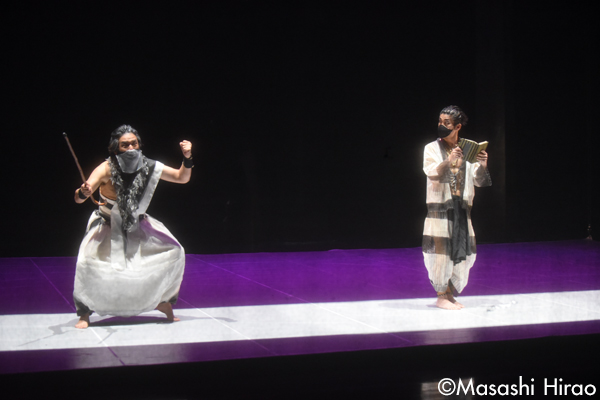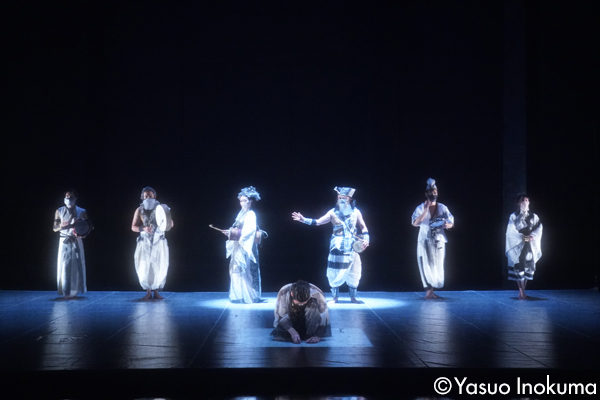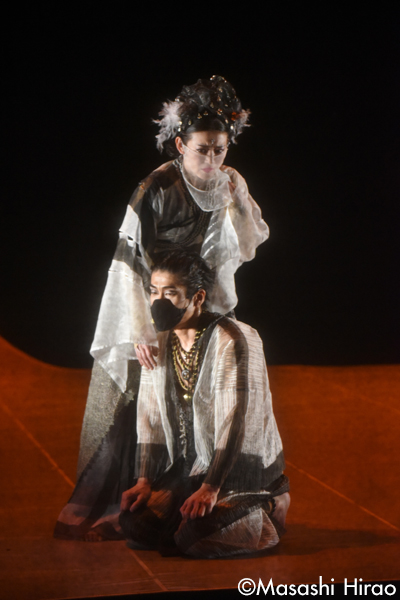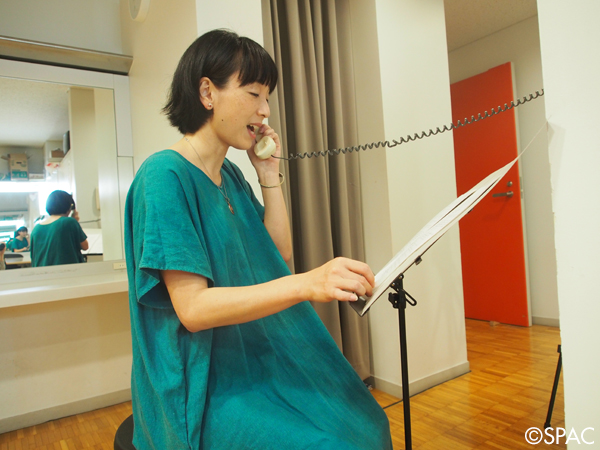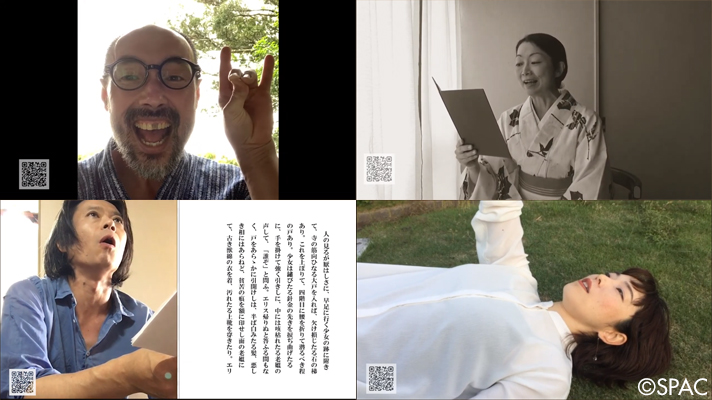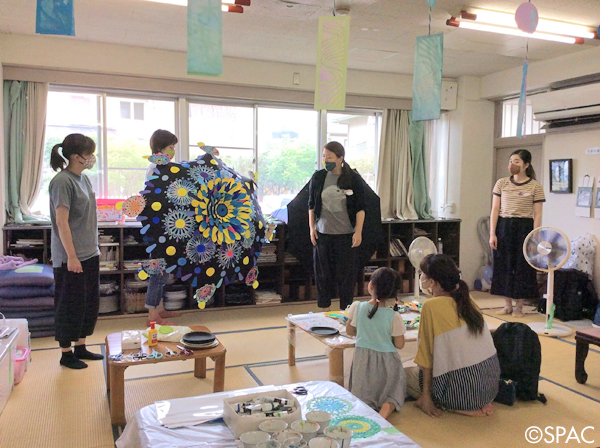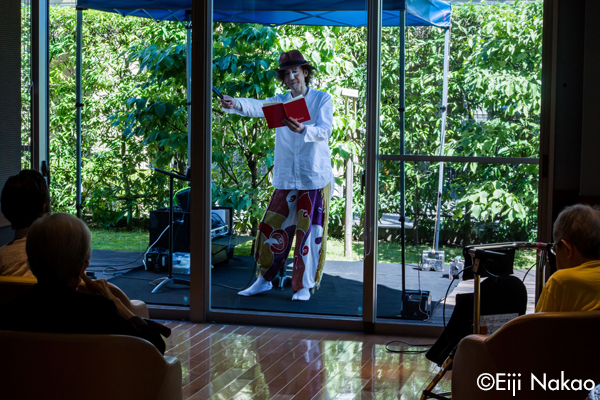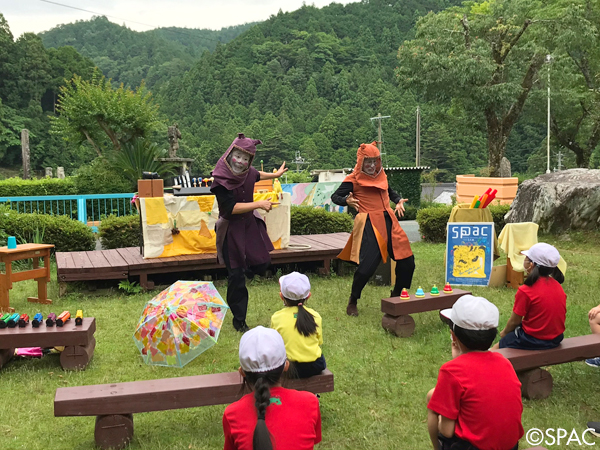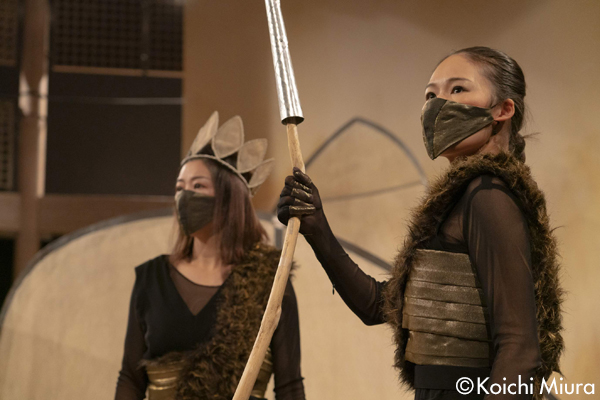Online “World Theater Festival on The Cloud 2020”
- I would like to begin by asking you about the effects of the coronavirus pandemic and how you have dealt with this situation.
- At the time when we had to cancel our performances of The Menam River Japanese in February of 2020, I never could have imagined that this kind of situation would befall us. All we knew about COVID-19 at that time was the information coming from the large cruise ship Diamond Princess that had docked in Yokohama with a number of infected passengers, and we couldn’t see that connecting to the performances we were doing at our theater. But after that, there came the explosive spread of infections in Europe, and what’s more, we began to hear about a very high death rate in other places, which made us realize that this was truly a global crisis.
That was when I first began to understand that this was a problem of a scale that we had never experienced before. It was surprising that the same virus could cause such different reactions in the people it infected, with some dying and others not having any symptoms at all. As the director of a theater, I thought that there was no real precedent to inform us how we should react. So, we thought about measures such as having higher-risk people sit in the second-floor seating, but then that would be called discrimination, wouldn’t it? As I have long said, the purpose of theater is to stitch together all division, but now the corona pandemic has brought divisions into theater. But, no matter how hard I thought about it, I could not come up with a way to stitch together the division that the difference in people’s susceptibility to the virus had brought into theater. I found it to be a very difficult problem that theater, for all its accumulated history of intelligence and creations, had never been expressed answers to before.
Meanwhile, a simple formula stating that the world had to protect itself against the common enemy that was the virus, became a sort of domestic mentality. The image of the virus as enemy became a common metaphor, making it a common cause to protect ourselves from that outside danger. Before long it became a thunderbird type image of “don’t let the virus defeat us!” or, “we must all band together and fight it.” Among the SPAC (Shizuoka Performing Arts Center) staff we had people who were in the midst of child raising, and so there was no way to question or not to align with this formula.
The actors all did their best to take countermeasures to keep from spreading the virus, and even when they went home, they had to keep two meters away from their own family members. So, if they met one their favorite audience members on the way to the rehearsal studio, should they still keep their guard up and refuse contact? As long as they are working as actors, I realized that there was no way to promise that they could not get infected at some point. And, if a cluster of infection were to break out at the rehearsal studio, we could no longer gather to rehearse. And, especially since SPAC is a Prefectural Theater Company, if a cluster of corona infections were to break out here, that would be a huge blow to the theater industry. Realizing that, we finally decided that the production of Mary Poppins with her Upside-down Umbrella, which we had begun rehearsing for on March 17 in order to perform it in our World Theatre Festival Shizuoka had to be cancelled. - On April 3rd you announced the cancellation of our World Theatre Festival Shizuoka, and then on the 10th you announced the holding of an online “On the Cloud 2020.” Would you tell us what led to the holding of the online festival “On the Cloud?”
- From around the time we decided to cancel rehearsals for Mary Poppins with her Upside-down Umbrella, I started thinking. Since we couldn’t do rehearsals, we also couldn’t do an online broadcast of an audience-less performance of the play. Suddenly not having theater in the world would not cause any real problems for most people. And even if theater people raised their voices in protest, that would only serve to widen the gulf. So, I posed this question to the actors: “Well, what should we do?” How can we communicate to people that there are people in society who need theater? And as a prefectural (public) theater, how can we do it in a way that convinces the taxpayers who support us of that need? Rather than accepting this problem passively, I asked them to think of some type of activity that would communicate something to them in some way.
The result was that I soon got some 60 pages or so of plans for a bid bunch of projects. I think it was a good indication of how worried they all were. When I separated the project proposals into categories, I found that there were a number of groupings, projects for the elderly or the IT illiterate, projects to broadcast contents online that were not necessarily theater-related to viewers, projects targeting our core SPAC fans, projects targeting children, etc. The result was the holding of a “World Theater Festival On The Cloud 2020” that included some of the projects they proposed as Blossom Program. - In a short time, you put together about 50 programs, and I imagine that must have been a big and tough challenge for theater people who are not very IT literate. And I was especially impressed by the fact that actually few of the contents were the usual film or videotapes of existing stage performances.
- If there was one thing that especially encouraged us, it was the fact that theater people around the world found themselves in basically the same situation as us. In the UK, in France, in Russia and Brazil, we were all the same. Theater people can’t be satisfied with virtual-world performances, and that is why they are doing theater. For theater people, who share the belief that “It’s good because it’s live,” when we have the live performance opportunity taken away from us [by the pandemic], that puts theater people around the world suddenly standing on the same start line. In a sense, that makes everything we do immediately fair and even, there are no longer people who are chasing after others, and I feel it was a good thing that we were all lined up along the same starting line to move forward from.
I know that many international directors disliked the idea of just broadcasting existing performance films or videos. I felt that doing that would be the beginning of the end, it would be like losing our last stronghold. But one director felt differently, that was Olivier Py. He said to me that the era of people like him and me was already over. Transportation to the theaters takes money, and the price of theater tickets is too high. From now on is the era of people who are poorer, so there are going to be more and more people how can only watch theater through filmed recordings. Still, everyone except Py disliked the idea.
In today’s circumstances, it is going to take about two years before people begin to come back to the theaters. So, I told our actors and our staff that they should stop thinking about how to keep doing things in the ways we have until now. So, I said that we need to start thinking about ways to spread our products to new fields, instead of the live stage performances that have been our main battlefield until now. So, our World Theater Festival On The Cloud 2020 became a program to experience that, and it became a proving ground for searching out things that were absolutely essential and couldn’t be compromised. - You have in the past said that if your live stage productions were prized crab meat, then online broadcast performances were like imitation crab meat, but have there been any things you have now learned something positive from in online programs?
- I felt something very positive from our experimental program Denwa de meisaku gekijo (Masterpiece Theater by phone), in which the actors performed (recited) scenes from famous plays to customers listening over the telephone. We got the idea for this from a program proposed by Wajdi Mouawad, the French-Canadian actor, playwright and director who has served as director of the La Colline national theatre in Paris, who had said that broadcasting streaming performance videos online was the last thing he ever wanted to do. The actors who experienced doing those recitations over the phone all said that they were really moved by the experience. They said that they had never had their lives felt how much people truly appreciated their work. Over the phone, the listeners can clearly hear the breathing of the actor speaking the lines [which can’t be heard from the stage]. And, I personally experienced how it turned into a once-in-a-lifetime opportunity to feel that you are face to face with the live actor.
SPAC Online Theater!
- After the results of “On the Cloud,” you launched “SPAC Online Theater” (*1) from June 2020 as a corona countermeasure program. Would you tell us about the details of the program and what you found from doing it?
- As part of this online [broadcast] program, our SPAC actors went to elementary, middle schools and high schools and performed serious dramatic recitations from the schools’ broadcasting rooms during lunch hour. This was very well received. Because there was a new rule that students couldn’t talk at the lunch tables [as a corona pandemic countermeasure] the lunch time had apparently become as quiet and unpleasant as a wake for the students, but with this program it became a time to enjoy the recitations in a dramatic atmosphere. The actors are used to performing at the theater where their audiences are people who have come to see the performance in a passive capacity. But in this case at the schools, where their audience was just ordinary children/students in their usual school environment, the actors were now in a situation where they felt that this was a test of whether or not the acting skills they had devoted their lives to acquiring would communicate something to an unexpecting audience. The student members of the schools’ broadcasting club would teach the SPAC actors how to use the equipment in the broadcasting room. And that seemed to be another very positive relationship.
- I guess you could call it “Lunchtime Theater,” couldn’t you?”
- That’s right. And we are now thinking of making this “Lunchtime Theater” and the Denwa de meisaku gekijo (Masterpiece Theater by phone) regular programs for us that we will continue next year.
- Rather than being just broadcasts of pre-recorded tapes, both the “Lunchtime Theater” and the other SPAC Online Theater programs a basically performed live. In other words, there is the interaction that comes with sharing “live” time, and it also creates the “phenomenon” of theatrical time that you always talk about. The corona pandemic has taken the theatrical time normally shared in the theater away from us, but these programs seem to give birth to a mysterious sort of space where theatrical time is interjected into daily life.
- I agree. Now there are audio contents being posted on YouTube and podcasts and the like, but these broadcasts can’t affect the viewers/listeners with a live experience. As more IT techniques are developed to broadcast things in this way, the number of media grows and viewers can enjoy them in any way they like, but they can’t influence live [stage] performances. The IT advances influence the techniques for broadcasting, but it doesn’t ask for anything from the audience in terms of listening skills, you might say, and where there should be an element of [mutual] communication as with a normal live performance, that element of communication with the audience is lost, I believe.
What the SPAC actors are doing now is different from that, they are trying to take that communication element that has been lost in online broadcasts and bring that communication element directly into the home. The SPAC actors are not only broadcasting content outward but also listening as they do it. This is true with our Masterpiece Theater by Phone program, where the actors are listening as they perform, listening hard to things like the slightest breaths or any other signs of communication from the listener. The actors say that this aspect completely changes the recitation experience for them. So, you might think that what they are doing is similar to radio broadcasts of readings of drama or literature, but it is different because of this aspect of mutual communication, which also means it will never be the same twice.
I feel that with regard to the skills of listening to information coming from a person you talk with is something that is looked down on today. The new IT technologies today have led to a lot of people who are good at presenting or posting things, and everyone admires people with that kind of skill and want to improve their own presenting skills, but I think that the skills or the ability to listen well is being ignored. In contrast to this trend, I find that our SPAC actors are trying hard to read even the slightest bits of information coming from listener on the other end of the line. I think this is a very important skill that actors particularly develop a keen sense for. What they are doing is making an effort to bring this skill into the very place where communication has now been taken away from us, and it is serving to revive communication in the home. - In your stage direction, you often use two performers to play one role. In other words, it is a style where you use a separate mover and a speaker to perform one character’s role. For that reason, your SPAC actors have to be more sensitive than usual at listening while they perform. When an actor is playing one character’s role alone, it is natural for them to put all of their attention into performing that role well. However, when two actors are performing the same character’s role, the actors are not performing the role by themselves, but rather, each must become a “medium” for performing the role. That need may lead to them becoming more adept at listening, couldn’t it?
- Perhaps, in a round-about sort of way, but it can also be said that it is a major role of theater to revive our ability to listen, and I feel that this a vein that runs deep. When a video is uploaded with a good presentation, that is similar to good acting in terms of the presenter’s facial expressions and articulation necessary, but the skills involved in such a presentation is only a matter of one-way communication (presentation). However, in the case of acting, the ability to listen is the basic fundamental, not only listening with the ears, but also being sensitive with the entire body to the facial expressions and movements shown by the other person to maximize their effect on you. I believe that is the true impact of what a theatrical performance can give you.
- Is that “ability to listen” as you describe it related to the fact that you yourself used to perform solo play performance?
- It does. The fact that I had done monodrama is actually related to the reason that I later used the 2-actor-per-role style of directing, because of the similarity to mirror expression. In monodrama, you can only use yourself for the acting, and I felt the limitations of it as a performance form because I could only use it in to communicate with the Japanese language that I was proficient in. On the other hand, the plays that I was performing were not speaking about myself. So, it was necessary for me to be transparent, or like a milk bottle, so it was actually better if I was not visible to the audience. So, I thought of it as an extreme form of performance that attempted to communicate only what was in the bottle. What I wanted to do was to be like a window, and there was a window frame that the audience could see, but then I wanted them to gradually stop being aware of the frame so that my world would connect directly to that of the audience. It is the same with having two actors play one character’s role, in that my aim was to have the actors become windows and the audience connects to them beyond the windows so that the actors became like mediums.
Creating Theater by Remote Means
- In October of 2020, you reopened the SPAC theater for the play Republic of the Bees. This was a play directed by Celine Schaffer and performed in a specially created Japanese version. And [due to the corona travel restrictions] Celine directed it remotely from France using Zoom. The SPAC actors gathered in the rehearsal studio in Shizuoka, where they all wore facial masks and maintained social distancing.
- Actually, there was something I was thinking about before we reopened the theater for performances. I had been optimistically thinking that we would be able to hold rehearsals in more normal conditions like before the pandemic, but in June the government issues an ordinance calling for avoidance of the “Three Cs” (Closed spaces, Crowded places, Close-contact settings). Because theater is the embodiment of the Three Cs, that ordinance was like a direct order that theater would not be permitted. That was extremely disheartening for theater people, and myself included, of course.
But then I realized the fact that in Kabuki theater the actors don’t actually touch each other, and the traditional Kabuki movements are all done with the actors at some distance from each other and never actually touching. And when I thought about it, ancient Greek tragedy is done on large stages where there are never more than three actors on stage at one time, and they all speak their lines facing the audience. The only violation of the Three Cs was that the actors might be close to each other, but they never faced each other, and the distance was always in line with the social distancing standard, and they all wore masks, which could be seen as an equivalent of facial masks. In that sense, I realized that ancient Greek tragedy obeyed all the “With Corona” rules. It is the same with Japanese Noh theater, which since ancient times has always avoided the Three Cs.
When I thought further, I realized that there had been two epidemics of the plague during Shakespeare’s day, but they never closed down all the theaters. There might have been theaters in London that closed, but there were always theaters outside of London that were open. Theater had coexisted with the epidemics, and theater had never gone into decline as a result of epidemics. Shakespeare’s theater was performed in semi-outdoor theaters, and they were lit with candles and kerosene lamps, so they may not have been such a sterile environment I would imagine. But by the late 19th century, with the spread of electricity, lighting inside the theaters used incandescent light bulbs, so they became more hygienically sound and safe spaces. Then, in that way they came to adopt the same kind of physical behavior as in a normal home. That was a form of progress, but some say that also weakened the impact of theater. In the play that time we had to abide by avoidance of the Three Cs, but at the same time the theater style could become more robust, like ancient Greek tragedy, so I thought it might be a good opportunity to stage a bold theater production.
So, Republic of the Bees was performed with no close contact, and we made sure that the lines were spoken either with the actors wearing masks or through recordings. As SPAC, we decided to cancel the planned February performances of The Menam River Japanese (direction by: Tomohiko Imai, February 29), and after that, the directors became able to direct by remote means, although there was some awkwardness at first, until we felt comfortable with the results.
We were also able to use remote methods to create a state where the audience and the actors felt that they were facing each other, and although they were never actually face to face physically in the same space, and create the palpable sense of perception of communication that the audience could enjoy. For example, there was a similarity in this to the way we know that lovers expressed their love for each other through the exchange of letters, with a degree of communication that made them feel as if they could imagine their lover’s physical presence through the written characters on the paper. I believe that this is a kind of literacy, the way actors train to use their bodies to communicate a shared world, so I feel that even using such remote methods, we can bring to life a sense of such communicative reverberations. And through such alternative methods, I felt that they accumulated the ability, or the technique, necessary to bring to life in the imagination real situations or physical presences in such a way. Therefore, I now feel that there is some degree of real potential in remote directing. - There is a detailed report on remote rehearsals on the SPAC website. Although distance is maintained between the actors, they are actually gathering to rehearse in the same studio, and as a result there is some level of what you call the “phenomenon” that theatrical time provides. And because of the increased distance, the phenomenon can actually become amplified. And watching it, I felt that in the remote rehearsals, the powerful directorial authority of the director in the rehearsal space is removed to a more remote presence, and that seems to make the director’s actions less emotional and give more distance in a way that made the director more of a objective observer. I felt that was another potential of remote directing.
- Directors usually think that it is important that they engrave their productions with their own personal concerns and tastes, but with remote directing they are force to concentrate on reading what comes across through the monitor screen, so I think it does actually become a more objective process.
- Because of the corona pandemic restrictions, the actors can not speak in loud voices, so there seems to be an increased us of microphones. What are your thoughts about the use of microphones?
- At SPAC we decided to set the distance and the speaking actors at 5.5 meters. The act of projecting the voice with full stage volume does sent out a considerable amount of spray, but when using a microphone, the actors hear their own voices from the spotter amps [on stage], which makes it easier for them to keep their vocal volume down. In that way, I think that a mic serves as a form of limiter. So, the use of mic technology as a form of support doesn’t really have a [detrimental] effect on what reaches the audience, because of the fact that the actors are using the expressive potential of their entire bodies.
Berlin State Opera production of Mithridates, King of Pontus
- You were commissioned by the Berlin State Opera to direct a production of Mithridates, King of Pontus (*2) that was scheduled to be performed in November. However, due to the lockdown in Berlin, it was postponed until February. After that, it was postponed again due to a second lockdown. On October 3rd of last year, you traveled to Berlin. Will you tell us what it was like working during the pandemic?
- Even while other countries were uncertain about when they would allow their theaters to reopen, Germany was quick to decide that they would reopen them for the September-October season, and for that reason we began making preparations little by little from June. In Japan we couldn’t do performances, and SPAC’s overseas performances that were planned for France and Russia had to be cancelled, but in Germany alone plans called for the start of rehearsals from October, so our set builders and costume makers were working steadily on preparations. In these uncertain circumstances, I was good for our mental stability to have at least one production moving forward constantly.
I hadn’t been able to leave Shizuoka for about seven months, but in order to get permission to travel to Germany, I went to the German Embassy in Tokyo. Then I went to Germany and started rehearsals, and in order to return to my original motivations, I started to think again about why international collaborations are necessary. In the pandemic, all countries had shut down their borders. In all countries, when facing a crisis like this, the tendency is to only want to live in the proximity of peoples of your own background. In such uncertain times, people’s defensive instincts make them feel there is greater risk involved in letting in the unknown, so they want to reject outsiders and remain exclusive. And since they don’t want to be exposed to new things, the arts go into decline. Theater are windows in society that allow new things to enter, and even when there is an exclusive mood in the society at large, if there is a theater, that should be a place that is open to things from the outside. For example, in Mithridates, the main character is performed by a tenor of the Māori race of New Zealand. In that way, the Berlin State Opera with its 278-year history becomes a window to the outside, accepting artists of different basic values, and by working hard together, opera provides an opportunity to show that it is no longer an art of a particular race, but a truly contemporary art form. And I believe that, especially in this time of pandemic, it is important that the Japanese theaters be aware that they should function as such a window. - Has the plan you use in directing changed in the process of introducing pandemic countermeasures?
- As I mentioned earlier, since the summer (2020), I came to see both ancient Greek tragedy and Japanese Kabuki as essentially “With Corona” theater forms, so I decided that I could do Mithridates in that time-honored style as well. In the dance scenes where close contact was unavoidable, we had the actors wear masks, but in the case of the singers, we basically had them well distanced and singing out toward the audience. We didn’t have them touch each other. So, to have them show how much they loved each other even from a sufficient distance, was something that required [acting] power and technique. That became an issue for the singers, but I believe we were successful in having everyone work together in that direction.
- The spatial structure of the stage art for that production was done by the same artist, Junpei Kizu, who handles stage art at SPAC, but were there any parts of the stage art plan that had to be changed for pandemic compliance?
- Mithridates was the first opera seria (grand Italian opera) that Mozart wrote, so it adopts a traditional style. Even before the corona pandemic, it has been an opera that conforms so much to traditional convention that it is lacking in the portrayal of lively human interaction. So, I wanted to take this opera seria, which many find old-fashioned in style, and bring it to life in a contemporary way. So, Kizu-san and I gave a presentation of a set that was flat overall in the style of a Kabuki stage. It adopted a number of steps [rising toward the rear], but it was designed in a way that avoided having the singers performing in front-rear positions, so they were always performing basically in lateral alignment. Although it wasn’t intentional, it ended up being a set that conformed well to corona requirements.
The World Theatre Festival Shizuoka 2021
- The holding of the World Theatre Festival Shizuoka 2021 (Apr. 24 – May 5) was been announced, and so has the program.
- As I mentioned before, no matter how exclusive and closed to the outside society may become in the face of the corona pandemic, the arts and theaters must remain open to the outside, or else they lose their meaning for existence. If they fail to do so, society itself becomes weakened to the point where it can easily break down. In order to keep society flexible and receptive, there have to be ways to receive outsiders, but under the present conditions, holding performances of touring productions with large casts is difficult for all practical purposes. So, we have to think about what we can do to introduce the values of overseas artists.
I was born in 1959, and when I think about when I was a child, Japan was too poor to invite touring productions from abroad. Nonetheless, overseas artists did come to Japan, and in the case of the famed conductor Karajan, he came all by himself to conduct Japanese orchestras. We strived to give people the chance to study the body and soul of even one artist and find in them different values, different world views and qualities that couldn’t be found in ourselves. Even if it could be from only one small well, we sought to do our best bring out of it what we could. So I want to continue that process of inviting overseas artists with different identities, even if it be only one at a time, and present them to the public.
But, since the festival was scheduled to start at the end of April, it was difficult at the time to invite overseas artists. I thought that it would be good if we could provide even monodramas, but there was still too much risk involved in having overseas artists perform on stage. So what we decided to do was to do a Shizuoka version of the Three Penny Opera that the Italian director Giorgio Barberio Corsetti had done at the 2018 Tokyo Festival using a Japanese cast. With this work, even if Corsetti was unable to come to Japan, we could still have him direct remotely as we had done with Republic of the Bees.
I had the opportunity to see Corsetti directing for the production at Tokyo Festival, and there was just something different about the way he loved the actors compared to us Japanese directors. Rather than making evaluations saying things like that actor can do this, so he is good for playing such-and-such a character’s role, Corsetti would love each individual actor in their entirety as they were. That is largely due to the individuality of Corsetti, but if I were to put it in somewhat simplistic terms, I might say he seemed very Italian in nature, or I might say he loved people like they were family. So I felt certain that even if it were a case of remote directing, he would still love the Japanese actors as he saw them on the Zoom screen. The performances will be on a temporary stage built in Sumpujo Park, where I’m sure the people who happen to see the outdoor performance will find the look of a real live actor’s in the flesh will be fascinating for them.
We will also have performances at the Open Air Theatre in Shizuoka Performing Arts Park of Mary Poppins with her Upside-down Umbrella (Written by: Juro Kara; Direction by: Satoshi Miyagi) that were cancelled last year, and performances of the SPAC production of Antigone in Sumpujo Castle Park. These are all outdoor theater performances. I think that with outdoor performances, it should be easier for people who don’t usually go to theaters to feel freer to come and enjoy the plays outdoors. In any event, this year we want avoid using online broadcasts and get people to come to see live performances. I wanted the audiences to see live actors in the flesh performing on stage. So, we thought about ways that we could do this. - As for our international program, in November we plan to have Irina Brook come from France to create a work in residence here.
- From October of 2021 to March of 2022, there will be a large program titled La Saison (the Season of France in Japan). This is part of mutual diplomacy events that began with the 2018 Japanese arts festival Japonisme that was held in June at venues centering around Paris. Since SPAC was kindly hosted for performances at the Japonisme event, we want to help present French arts here in Japan, and so this autumn we are programming a number of France-related works. These will include Republic of the Bees (October), Director Daniel Jeanneteau’s production of The Cherry Orchard (November-December), a work that Yoshi Oïda and Kaori Ito created in France titled Aya no Tsuzumi (The Damask/Twill Drum) (December) and Irina-san will be invited to present House of Us ~ Hamlet/ Kodoku na Kage (tentative title) (November).
Irina’s father is the famous director Peter Brook, and her mother is the famous actress Natasha Parry. Irina-san says that to her eyes, Natasha is a sort of reclusive person who spends her time between the theater, their home and her own room. When Irina came to Shizuoka Performing Arts Park, she told me that if it were here in this park, she could probably do a work about Nastasha that she had long been wanting to create. It seemed that Irina felt that in this park, with its numerous small buildings and a theater in a natural setting, she felt that she could express the vision she had of a map of the world in Nastasha’s mind. Hearing this, I became very interested in the idea. I felt that here, she might be able create a work that virtually entered the body, in something like a “return to the womb” type of memory trip. I envision that it might be a work with only one or two live actors performing, and only a few viewers (audience) walking around as they watch it. At first, we were talking about a residence for Irina of perhaps three months, but under the present conditions it looks like it might be closer to three weeks. From the Shizuoka Performing Arts Park, which is like a navel of nature, I hope that an even narrower, long tunnel can reach out to connect from Japan to the world like a circuit. - As a new project, you have announced that you will start a “SPAC Academy of Theatre” for high school students beginning this year. In closing, will you tell us about your ideas behind this Academy of Theatre?
- In Japan today, there is tendency to suppress individuality and strive for equalization up until university, and then once young people enter university and join a student drama club, they are suddenly expected to show individual output. It seems to me that a young person put in that position is not likely to last very long as an expressive performer or artist. So, we want to reverse that process.
That would be to have high school students during their ages of 15 to 18 receive lots of stimulating experiences while keeping their differences, their individuality intact, as they build their aesthetic awareness. And then, to have them enter university at the age of 18, and from there until the age of 22 receive a lot of new input, rather than being expected to suddenly produce output. And it is better if that input is not just in theater, but in wide range of knowledge and thought, from philosophy, politics and economics to natural science, linguistics and more. People who are truly intent on devoting themselves to artistic expression, there is plenty of time for them to develop as artists even if they wait until their mid-20s to begin participating in work that requires output. As a means to initiate this kind of approach, we have started this theater academy for high school students.
We are now soliciting applicants for what we plan to be small classes of about 15. The plan is to have them meet about three times a week at SPAC, where they will be able to see outstanding theater works, meet interesting, or perhaps even weird, artists, while also going through a course including classroom learning in various fields. And, the most important thing of all is that we want them to acquire a stimulating group of friends in their fellow academy course members. Whereas, in their normal high school lives they are exposed to what you would call peer pressure that prevents them from expressing their individuality, we want this academy to be a place where they can meet adults like artists who are decidedly “different” and see that they are still able to live and flourish as individuals (laughs). What we want is to create a place where they can keep their own individuality.


